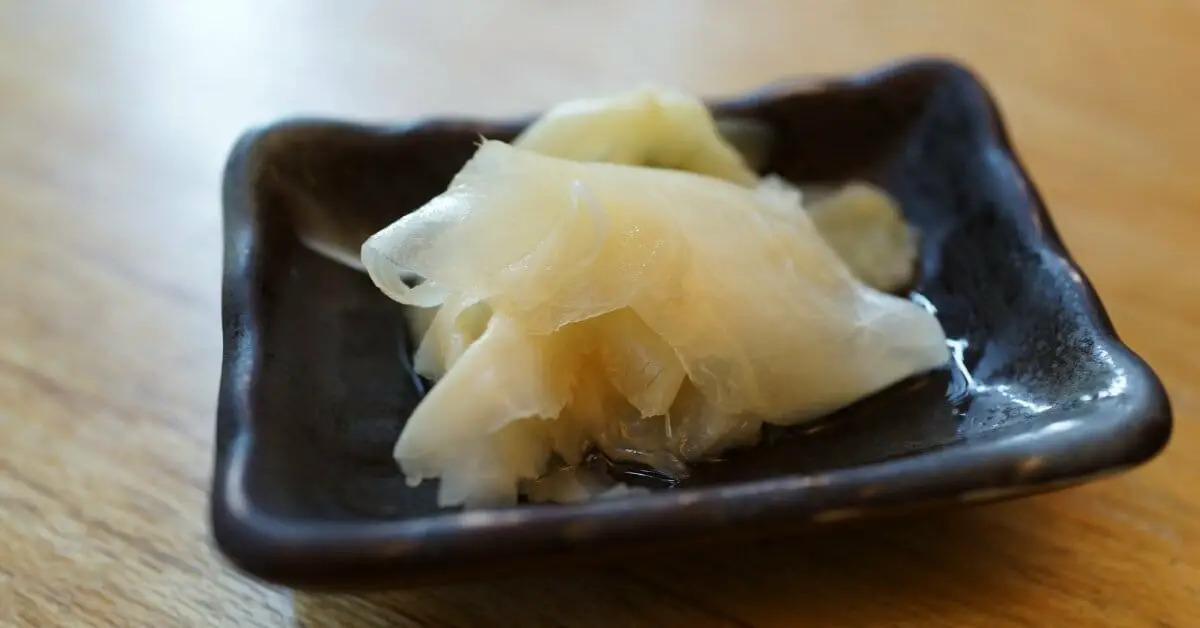In the world of culinary delights, pickled ginger is a familiar accompaniment, often gracing our plates alongside delectable servings of sushi and sashimi. However, beyond its role as a zesty and palate-cleansing condiment, many are left wondering if pickled ginger offers more than just a tangy kick. If you’re wondering about the potential health benefits of pickled ginger, you might be asking yourself, “Is pickled ginger good for you?” In this extensive article, we thoroughly examine the intricate nutritional makeup of pickled ginger and delve into its potential health benefits, exploring the impact of its consumption can contribute significantly to one’s overall well-being.
The Nutritional Breakdown
Rich in Antioxidants and Nutrients
Pickled ginger emerges as a low-calorie addition to your dietary regime, a flavourful garnish that introduces a medley of nutritional elements to your plate. Among its notable attributes are the presence of antioxidants, namely gingerol and shogaol. These potent antioxidants are instrumental in combating oxidative stress, which can play a pivotal role in mitigating the risk of chronic ailments.
Essential Vitamins and Minerals
Beneath its tangy exterior lies a treasure trove of essential vitamins and minerals that are pivotal to maintaining optimal health. Vitamin B6, recognized for its role in brain health and metabolic processes, makes an appearance alongside magnesium, a mineral crucial for supporting both nerve function and muscle health. Additionally, the inclusion of potassium, a key player in heart rhythm regulation and fluid equilibrium within the body, further elevates pickled ginger’s nutritional profile.
The Potential Health Benefits
Digestive Aid
Steeped in tradition, pickled ginger has earned its reputation as a digestive aid. The presence of gingerol, a bioactive compound found within ginger, initiates a cascade of digestive responses. It stimulates the production of saliva and digestive juices, thereby facilitating the digestion process. Furthermore, its potential to alleviate symptoms of indigestion, bloating, and nausea cannot be overlooked, offering a natural and soothing remedy for gastrointestinal discomfort.
Anti-Inflammatory Properties
Delving deeper, we encounter gingerol once again, this time celebrated for its anti-inflammatory prowess. Incorporating pickled ginger into your diet might bestow a shield against inflammation, positioning it as a potential remedy for conditions such as osteoarthritis and the post-exercise muscle soreness that plagues many fitness enthusiasts.
Nausea Relief
The connection between pickled ginger and the alleviation of nausea has been etched in culinary culture for years. Particularly effective in combatting motion sickness and the queasiness of pregnancy-related morning sickness, the compounds in pickled ginger are believed to soothe the stomach and offer respite from the discomfort of nausea.
Immune System Boost
In the realm of fortifying the body’s defenses, pickled ginger emerges as an ally. Its robust antioxidant content serves as a formidable defense mechanism against free radicals, thereby bolstering the immune system’s efficacy. By reducing the vulnerability to infections, the regular inclusion of pickled ginger might translate into a stronger and more resilient immune response.
Blood Sugar Regulation
Emerging research hints at the potential of ginger in regulating blood sugar levels. This property makes pickled ginger a consideration for individuals seeking to manage their blood sugar levels or those grappling with diabetes. However, moderation remains the key, as with any dietary component.
Incorporating Pickled Ginger into Your Diet
Sushi and Beyond
While its affinity with sushi is widely acknowledged, the versatility of pickled ginger transcends cultural boundaries. Beyond Japanese cuisine, this condiment can lend its zest to salads, marinades, and even innovative cocktails. The culinary landscape becomes your canvas as you explore the diverse applications of pickled ginger.
Moderation is Key
As with many things in life, moderation is paramount. The intense flavour profile of pickled ginger necessitates its judicious use to prevent overwhelming the taste buds. By incorporating it as a harmonious component of a balanced diet, you ensure a harmonious integration of flavour and nutritional benefits.
Conclusion
In summation, pickled ginger is a condiment that extends beyond its role as a flavourful companion to sushi. Its potential health benefits are substantial, ranging from digestive assistance and anti-inflammatory effects to nausea relief and immune system support. This zesty condiment indeed has a lot to offer, so the next time you embark on a culinary adventure, consider the addition of pickled ginger as a savoury enhancement that could contribute positively to your well-being. For more detailed information like this you can visit Nifty Wellness.
Frequently Asked Questions (FAQs)
Can pickled ginger replace fresh ginger in recipes?
While pickled ginger can add a unique flavour and tanginess to your dishes, it might not always be a direct replacement for fresh ginger. Fresh ginger offers a more intense and robust ginger flavour, while pickled ginger introduces a slightly sweet and acidic taste. Depending on the recipe and the desired outcome, you can experiment with using pickled ginger as a complementary flavour or as a creative twist to traditional dishes. However, if the recipe specifically calls for the strong and distinct taste of fresh ginger, it’s best to use fresh ginger itself.
Can pickled ginger alleviate morning sickness during pregnancy?
Yes, pickled ginger is often recommended as a natural remedy for morning sickness during pregnancy. The soothing and anti-nausea properties of ginger can provide relief from the queasy feeling commonly experienced by pregnant women. Consuming a small amount of pickled ginger, either on its own or as part of a meal, might help alleviate nausea. However, it’s important to consult your healthcare provider before making any significant changes to your diet, especially during pregnancy.
Are there any individuals who should exercise caution with pickled ginger consumption?
While pickled ginger offers many potential health benefits, there are a few groups of individuals who should exercise caution. People with hypertension or those who need to limit their sodium intake should be mindful of the sodium content in pickled ginger. Additionally, individuals with gallstones, ulcers, or other digestive issues may want to moderate their consumption, as ginger can sometimes exacerbate these conditions. As always, consulting a healthcare professional before making dietary changes is advised, especially if you have underlying health concerns.
Is it possible to prepare homemade pickled ginger?
Absolutely, making homemade pickled ginger is not only possible but also quite rewarding. It allows you to control the ingredients and flavours to suit your preferences. To prepare pickled ginger at home, you’ll need fresh ginger root, rice vinegar, sugar, and salt. The ginger is typically peeled and thinly sliced, then immersed in a mixture of rice vinegar, sugar, and salt. The mixture is left to marinate for a period of time, usually a few hours or overnight, until the flavours meld together. Homemade pickled ginger can be a versatile addition to your meals and offers the satisfaction of creating something delicious from scratch.
How frequently should one consume pickled ginger for optimal health benefits?
There is no strict rule for how often you should consume pickled ginger, but moderation is key. Including pickled ginger in your diet a few times a week can provide you with its potential health benefits without overdoing it. Remember that pickled ginger can be relatively high in sodium due to the pickling process, so it’s important to be mindful of your overall sodium intake. If you’re pregnant and using pickled ginger to manage morning sickness, consult your healthcare provider for guidance on the appropriate frequency of consumption.
Read Also: The Role of Nutrition in Dental Health: Foods That Strengthen Teeth




